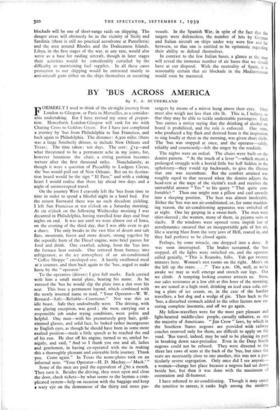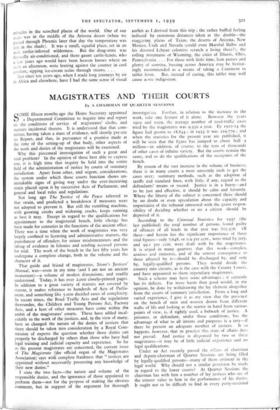BY 'BUS ACROSS AMERICA
By F. J. SUTHERLAND
FORMERLY I used to think of the all-night journey from London to Glasgow, or Paris to Marseilles, as a consider- able undertaking. But I have revised my sense of propor- tion. Henceforth London-Glasgow will rank for me with Charing Cross to Golders Green. For I have just completed a journey by 'bus from Philadelphia to San Francisco, and back again to Philadelphia. The distance : 6,30o miles (there was a large Southerly detour, to include New Orleans and Texas). The time taken: ten days. The cost: £14—and what threatened to be a permanent ache in my joints, for, however luxurious the chair, a sitting position becomes torture after the first thousand miles. Nonchalantly, as though it were a question of Piccadilly to Ludgate Circus, the 'bus would pull out of New Orleans. But on its destina- tion board would be the sign " El Paso," and with a sinking heart I would realise that there lay ahead two days and a ^night of uninterrupted travel.
On the journey West I cravenly left the 'bus from time to time in order to spend a blissful night in a hotel bed. For the return Eastward there was no such decadent yielding. I left San Francisco at ten o'clock on a Saturday morning. At six o'clock on the following Wednesday morning I was decanted in Philadelphia, having travelled four days and four nights on end. It was not until we were almost out of Iowa, on the evening of the third day, that I was able even to get a shave. The only breaks in the vast blur of desert and salt flats, mountain, forest and more desert, strung together by the soporific hum of the Diesel engine, were brief pauses for food and drink. One crawled, aching, from the 'bus into the furnace heat outside. One tottered from furnace into refrigerator, as the icy atmosphere of an air-conditioned " Coffee Shoppe " enveloped one. A hastily swallowed meal at a counter, and then back again to the 'bus, urged to make haste by the " operator."
To the operators (drivers) I give full marks. Each carried with him a small metal plate, bearing his name. As he entered the 'bus he would slip the plate into a slot over his seat. This bore a permanent legend, which combined with the newly inserted name to read, " Your Operator--W. W. Bernard—Safe—Reliable--Courteous." Nor was this an idle boast. Safe they undoubtedly were. The driving, with one glaring exception, was good ; the men, carrying out a responsible job under trying conditions, were polite and helpful. One man—with his prematurely grey hair, gold- rimmed glasses, and solid face, he looked rather incongruous to English eyes, as though he should have been in some more exalted position—made a little speech as he reached the end of his run. He shut off his engine, turned to us, smiled be- nignly, and said, " And so I thank you one and all, ladies and gentlemen, in having co-operated with me in making this a thoroughly pleasant and enjoyable little journey. Thank you. Come again." In Texas the name-plates took on an informal note. "Your Operator—H. D. Mackay.—` Mack.' " Some of the men are paid the equivalent of £60 a month. They earn it. Besides the driving, they must open and close the door, check tickets—by what seems to the layman a com- plicated system—help on occasion with the baggage and keep a wary eye on the demeanour of the thirty and more pas- sengers by means of a mirror hung above their eyes. They must also weigh not less than 18o lb. This is, I believe, so that they may be able to tackle undesirable passengers. Each 'bus carries a notice saying that the drinking of alcohol on board is prohibited, and the rule is enforced. One man, who produced a hip flask and derived from it the inspiration to sing loudly at three in the morning, was given short shrift. The 'bus was stopped at once, and the operator—safely, reliably and courteously—left the singer by the roadside.
The nights were an ordeal. The chairs were built on the dentist pattern. " At the touch of a lever "—which meant a prolonged struggle with a horrid little bar half hidden in the upholstery—they would tip backwards, to give the illusion that one was recumbent. But the comfort attained was roughly equal to that secured when the dentist adjusts the head-rest at the nape of the victim's neck and receives the untruthful answer " Yes " to his query " That quite com- fortable? " Then one might rent a pillow and curl uneasily into a sleeping position. The heat was almost intolerable. Either the 'bus was not air-conditioned, or, for some madden- ing reason, the air-conditioning apparatus was switched off at night. One lay gasping in a sweat-bath. The men were shirt-sleeved ; the women, many of them, in pyjama suits or slacks. If the windows were opened some impish law of aerodynamics ensured that an insupportable gale of hot air, like a searing blast from the very jaws of Hell, roared in, and they had perforce to be closed again.
Perhaps, by some miracle, one dropped into a doze. It was soon interrupted. The brakes screamed, the 'bus stopped, all the lights were switched on, and the operator called genially, " This is Roanoke, folks. Yah got twenny minutes here. Women's rest rooms on the right. Men's on the left up the stairs. . . ." Two a.m. Oh, well, as we're awake we may as well emerge and stretch our legs. Out we climb. A tempting looking counter attracts us. Soon, our sales resistance at a low ebb at this hour of the morning, we are seated at a high stool, drinking an iced coca cola, eat- ing a plate of ice cream, or, in the case of the hardier travellers, a hot dog and a wedge of pie. Then back to the 'bus, a disturbed stomach added to the other factors now en- suring complete insomnia, and off we go again.
My fellow-travellers were for the most part pleasant and light-hearted middle-class people, casually talkative, as are the majority of Americans. " Jim Crow " laws, by which in the Southern States negroes are provided with railway coaches reserved only for them, are difficult to apply on the road. 'Bus travel, indeed, may be said to be playing its part in breaking down race-prejudice. Even in the Deep South negroes could not be refused. They were directed to the three last rows of seats at the back of the 'bus, but since the seats are necessarily close to one another, this was not a par- ticularly severe segregation. Only once did I see anyone— a woman—change her place because a negress had sat down beside her, but then it was done with the maximum of ostentation and ill-humour.
I have referred to air-conditioning. Though it may cause the sensitive to sneeze, it ranks high among the modern miracles in the scorched places of the world. One of our stops was in the middle of the Arizona desert (when we passed through Phoenix later that day the temperature was 109 in the shade). It was a small, squalid place, set in an and, rattler-infested wilderness. But the drug-store was blessedly air-conditioned, and there gaunt cattle-hands, who a few years ago would have been heaven knows where on such an afternoon, were leaning against the counter in cool comfort, sipping ice-cream sodas through straws. . . .
Not since ten years ago, when I made long journeys by air in Africa and elsewhere, have I had the same sense of visual surfeit as I derived from this trip ; the rather baffled feeling induced by enormous distances taken at the double—the staggering plains of Texas, the deserts of Arizona, New Mexico, Utah and Nevada (could even Marshal Balbo and his devoted Libyan colonists scratch a living there?), the rolling mountains of Wyoming, the cities of Illinois, Ohio, Pennsylvania. .. . For those with little time, lean purses and plenty of stamina, bussing across America may be hesitat- ingly recommended as a means of taking a Continent in tablet form. But, instead of curing, this tablet may well cause acute indigestion.



































 Previous page
Previous page